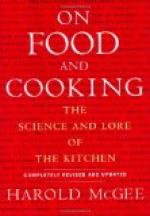to the safe-keeping of his protective instincts.
You need not fear that he will swerve from the
path of health when his simple habits, sanctioned
by nature and inclination, have acquired the additional
strength of long practice. When the age of
blind deference is past, vice is generally too
unattractive to be very dangerous.—Oswald.
That a child inherits certain likes and dislikes in the matter of food cannot be questioned, and does not in the least forbid the training of the child’s taste toward that which is healthful and upbuilding; it merely adds an element to be considered in the training.—Sel.
Prevention is better than
cure. It is worth a life effort to lift a
man from degradation.
To prevent his fall is better.—Gough.
A cynical French writer of the last century intending a satire upon the principles of vegetarianism adopted by Phillippe Hecquet, puts into the mouth of one of the characters in his book what, in the grossly voluptuous life of that country and time, the author no doubt imagined to be the greatest absurdities conceivable in reference to diet, but which, in the light of present civilization are but the merest hygienic truths. A doctor had been called to a gouty and fever-stricken patient. “Pray what is your ordinary diet?” asked the physician.
“My usual food,” replied the patient, “is broth and juicy meat.”
“Broth and juicy meat!” cried the doctor, alarmed. “I do not wonder to find you sick; such dishes are poisoned pleasures and snares that luxury spreads for mankind, so as to ruin them the more effectually.... How old are you, pray?”
“I am in my sixty-ninth year,” replied the patient.
“Exactly,” ... said the physician; “if you had drunk nothing else than pure water all your life, and had been satisfied with simple nourishment,—such as boiled apples for example,—you would not now be tormented with the gout, and all your limbs would perform their functions with ease.”
Dr. Horace Bushnell says: “The child is taken when his training begins in a state of naturalness as respects all the bodily tastes and tempers, and the endeavour should be to keep him in that key, to let no stimulation of excess or delicacy disturb the simplicity of nature, and no sensual pleasure in the name of food become a want or expectation of his appetite. Any artificial appetite begun is the beginning of distemper, disease, and a general disturbance of natural proportion. Nine tenths of the intemperate drinking begins, not in grief and destitution, as we so often hear, but in vicious feeding.”
Always let the food be simply for nourishment—never more, never less. Never should food be taken for its own sake, but for the sake of promoting bodily and mental activity. Still less should the peculiarities of food, its taste or delicacy




